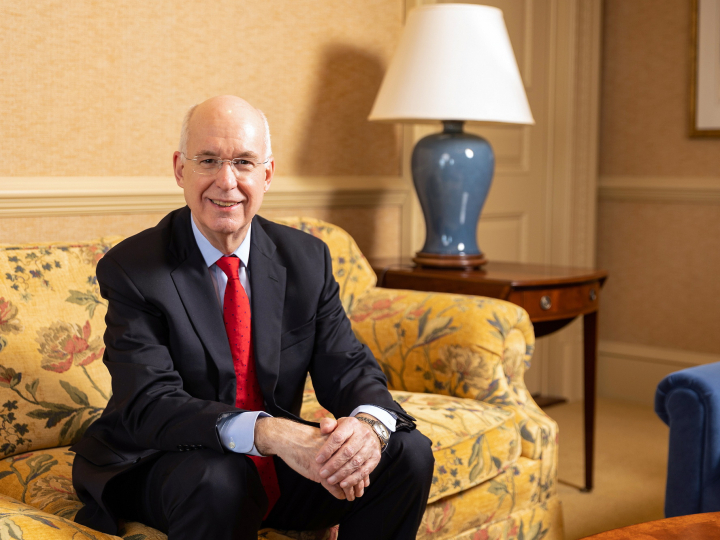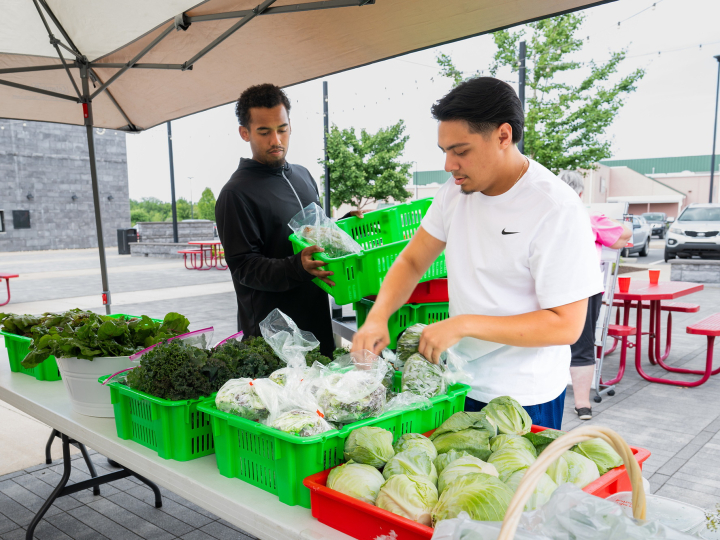The Big and Small Questions of Sustainability
April 15, 2016
The subject of global sustainability presents questions big and small. It asks how the world can feed its 7 billion residents today and as many as 11 billion in the next century, but it can also call into question the food on your plate. Who raised and prepared it for you? Is it sufficient to fuel your body? Where will the leftovers go if you've taken more than you can eat?
At Bucknell University's fourth annual Sustainability Symposium, held on campus April 4–8, faculty, students and staff posed the big questions about sustainability, examining global frameworks such as the Paris Agreement signed in December, the 17 Sustainable Development Goals put forth by the U.N. last September and the emerging concept of the Anthropocene Era as a means for understanding changes to the planet brought on by human activity.
"The theme for this year's symposium is framed around global sustainabilities," said Peter Wilshusen, executive director of the Bucknell Center for Sustainability & the Environment and professor of environmental studies. "We purposefully decided to make sustainability a plural to get at the idea of multiple things happening simultaneously. The idea of global sustainabilities frames the term as a multiplicity of ideas and actions operating across social scales."
They also examined Bucknell's place within the global sustainability movement and asked how the University and the individuals who comprise it can contribute. At a luncheon April 7, Professor of Economics Nancy White, who studies food waste, led students, faculty and staff in a participatory exercise in mindful eating, which asked those sharing the meal to examine their own hunger, eat deliberately and keep in mind others who made their meal possible.
"Mindful eating is first interior work — it begins with each of us. But it doesn't stop there," White said. "If we eat mindfully and reduce our food waste, other things can come of that."
At a discussion immediately following the luncheon, titled "Feeding and Fueling the World," an interdisciplinary panel comprised of science, engineering, social science and humanities professors expanded on the same theme at a variety of levels. The panel's interdisciplinary nature allowed it "to transcend some of the scales at which we usually consider these problems," said Professor Clare Sammells, sociology & anthropology, the panel's chair.
"From questions about soil and plants to water systems and technologies, thinking about culture from the scale of global economies all the way down to the table and who we're sitting with, these are all scales we need to take into account to address the challenges of our future."
Other events in the symposium examined sustainability movements and the challenges of sustainable development both globally and locally. Professor Amanda Wooden, director of the Environmental Studies Program, helped organize a screening at the Campus Theatre of the documentary Flowers of Freedom, which examines mining, community conflict and activism in Kyrgyzstan and moderated a discussion with Mirjam Leuze, the filmmaker and Erkingul Imankodjoeva, the activist and former member of the Kyrgyz Parliament who stars in the film.
At another panel, Bucknell students shared lessons in sustainability they took from the countries where they had studied abroad. Additional students shared their own work on sustainability-related projects during a research-poster session.
"It has been cool to see the different parts of life it impacts," said Kerry Stahlin '16, who attended several symposium events. "Sustainability is everywhere. You can think about it and act on it in so many different ways. I think this symposium is helping us take control of that and find different ways we can use sustainability."
The symposium's keynote speaker, author and Brown University Professor Timmons Roberts, likewise addressed sustainability at both the global and local levels. At his keynote speech, which reviewed worldwide efforts to control climate change, Roberts stressed the need for an interdisciplinary approach.
"I think there is a new awareness that everybody needs to be part of the solution," Roberts said. Not only do all countries large and small need to commit to climate action, he noted, but people from all walks of life need to take part as well.
"We need everybody," Roberts said. "Every field has so much to teach us about this. We're not going to solve this problem by telling people 'No, you can't use your SUV.' We need to offer them a positive future, so we need storytellers, we need visionaries, we need artists, we need musicians, we need writers and we need administrators.
"It's going to take a lot of work and it's going to take all of our creativity."
At a roundtable discussion the following morning, Roberts joined students, faculty and staff members in brainstorming creative ways to catalyze climate action at Bucknell. Roberts shared stories of how his students at Brown University had prompted changes not only in institutional policy, but in state-level policy as well. Members of the Bucknell community, meanwhile, outlined both challenges and opportunities for meeting the goals of the Carbon Commitment (formerly the American College & University Presidents Climate Commitment), which Bucknell signed in 2008 with the goal of moving toward carbon neutrality by 2030.
"You have more power than you know," Dina El-Mogazi, director of the Sustainable Design Program at Bucknell, told students in the group. "To have students out front doing these kinds of things is really powerful and could change a lot."
Students attending the symposium said it empowered them consider how their own actions can impact the global sustainability movement.
"I think global sustainability is local sustainability," said Dee Huang, a mechanical engineering and chemistry major in the fourth year of his 5-year program. "It's the same world. What you do on this side impacts everyone, even on the other side of the world."
The symposium was organized by the Bucknell Center for Sustainability & the Environment with support from the Office of the Provost; the departments of political science, international relations, sociology & anthropology and geology & environmental geosciences; and the film/media studies, German studies and Russian studies programs.

